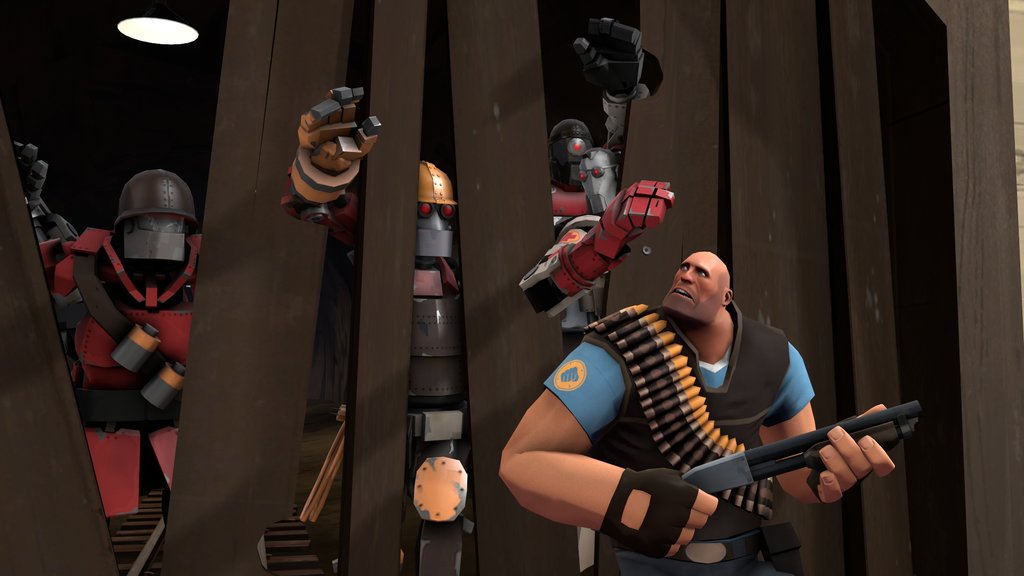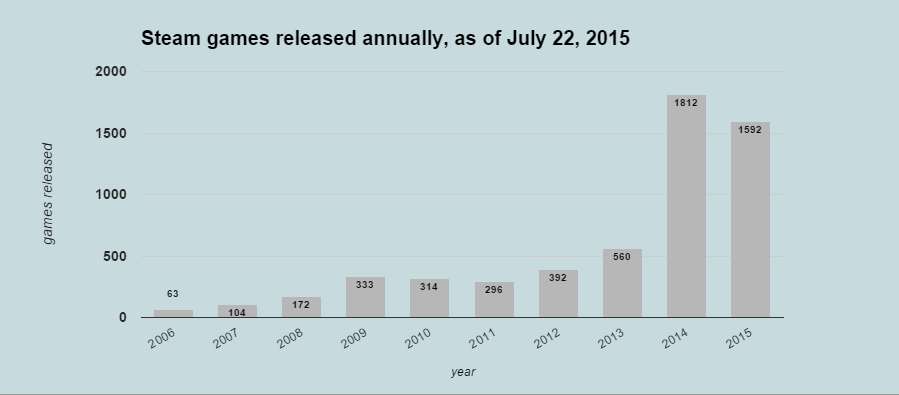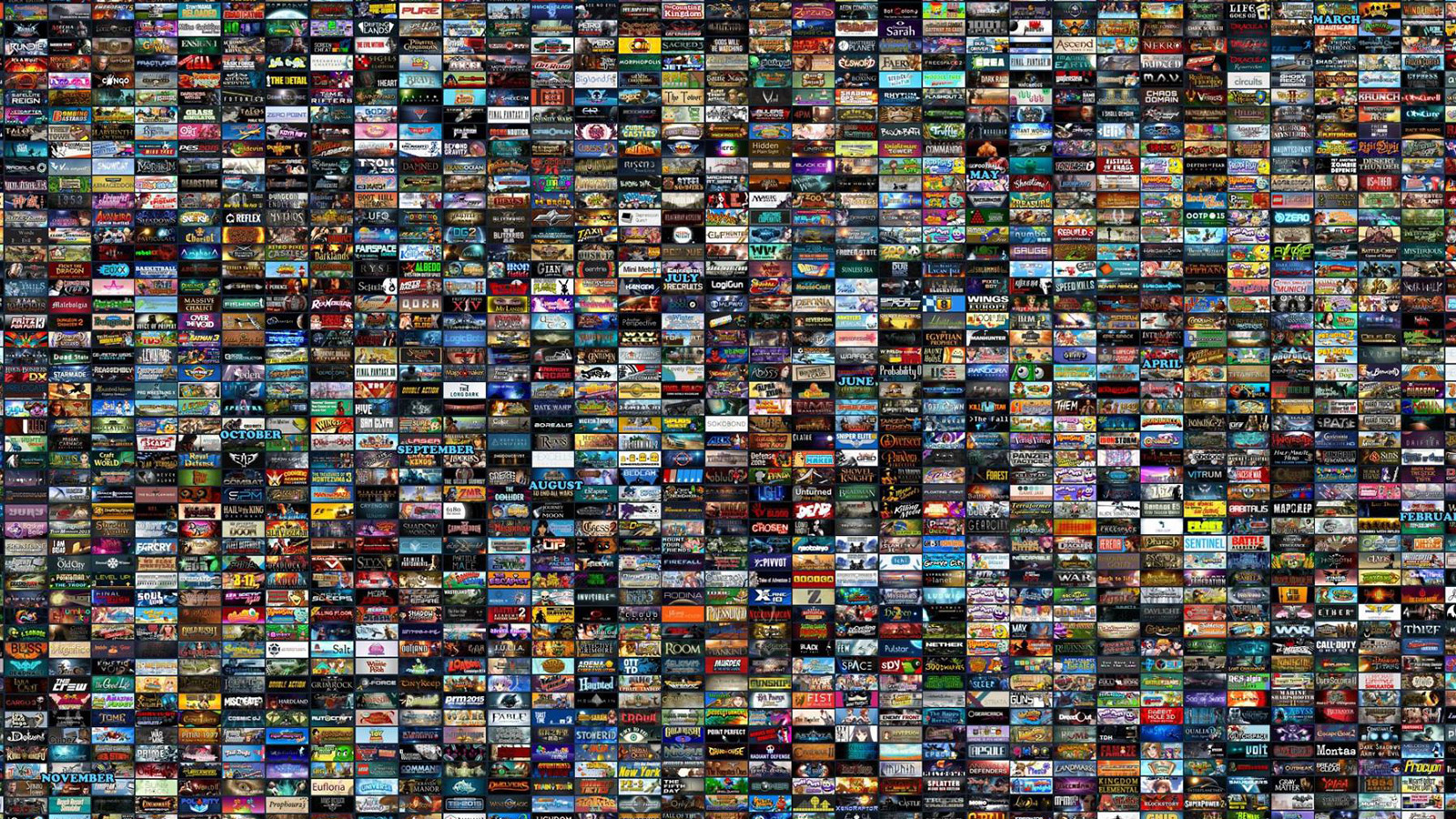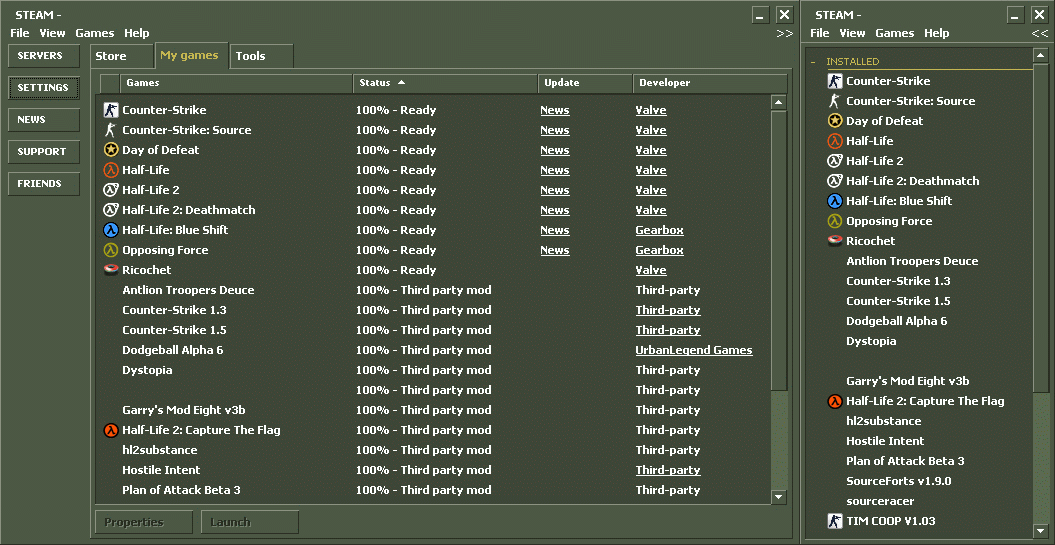There aren't 'too many' games on Steam

Since the time Valve began publicly tracking hours-played in July 2009, I’ve launched 341 different games from Steam. Today, Steam adds at least that many games each month and a half—55 each week, on average, or almost eight per day. There’s no question that Steam is saturated. Steam grew by 561 games in 2013, but added 1,814 in 2014. Seven months into 2015, there’s already 1,592 new games on Steam. But is that truly a problem?
Steam’s library is growing at the fastest rate in its 12-year history, and those of us who play and write about PC games full-time will never dig more than a spoon into Steam’s mountain range of more than 5,600 games. It’s certainly tempting, even natural, to label that as a problem. Last year, there was a wave of concern following a Gamasutra post that visualized the volume of new games hitting Steam. Kotaku wrote that the trend was hurting developers and gamers. Spiderweb Software’s Jeff Vogel told of the imminent burst of the indie bubble, and others jumped up from their chairs to agree: there are too many games on Steam.
Seven months into 2015, there’s already 1,592 new games on Steam.
Those who point at the perpetual logjam of new releases feel that Valve has abandoned any semblance of quality control. They fear that Steam will become like the App Store, known more for what it rejects than what it showcases. And they have a point: who wants lazy mobile game ports, halfheartedly erotic pinball, soccer-fighting games, something called SpaceCorn, or Gynophobia, “a horror shooter about abnormal fear of women,” on Steam? How can deserving, independent gems to stand out in an ecosystem filled with junk? And when games do break through, how can developers retain interest long enough to build a healthy community?
The most irrationally paranoid thought is that we’re inching toward the PC gaming equivalent of the video game crash of ‘83, when the level of saturation of games and platforms gutted the industry, forcing many hardware-makers and publishers to collapse or withdraw forever. Consider this prescient quote from 1986 by Hiroshi Yamauchi, Nintendo’s president: “Atari collapsed because they gave too much freedom to third-party developers and the market was swamped with rubbish games.”

How small studios feel about Steam
Whatever your reaction to this trend, the people whose lives are most braided to it are independent developers and publishers. And when I reached out to them to talk about Steam, I was surprised that the majority of them are unfazed by how crowded Valve’s platform has become.
To Swen Vincke, CEO at Larian Studios, today’s Steam is simply a return to the way things were before digital distribution, but not in a bad way. “Access to retail used to determine which games we got to play, something that hampered the evolution of videogames,” says Vincke, who believes digital distribution has created “a true renaissance” in the industry. “However, the quantity of games being released now means that the new barrier to entry has become discoverability, and as a developer you need to plan from day one how your target audience will find out about your game, and ensure that your game has more reasons to be played by players than a similar game your competitor may be making. Which, if you think about it, is exactly how it’s always been. There are just more competitors now, so there’s no room for slacking. That’s a good thing, too, in my opinion.”
Paradox Interactive has grown in parallel with Steam over the past several years. They’ve become a more diverse publisher in that time, having a hand in Pillars of Eternity this year as well as Cities: Skylines and stuff like Magicka. Despite this, you’d expect Paradox to be exactly the sort of entity that’s sensitive to a crowded market. Games like Crusader Kings and Europa Universalis—heritage franchises for Paradox—rely on word of mouth, on player anecdotes, to spread their reputations, capture attention, and grow.
Keep up to date with the most important stories and the best deals, as picked by the PC Gamer team.

But Susana Meza Graham, COO at Paradox, mostly shrugs off Steam’s open-doors policy. “Yes, on any given day, there are a lot of games being released. And of course visibility is a challenge for developers, just like navigating the content is a challenge for consumers,” says Meza Graham. “But the challenge of visibility has always been there for us in one way or another. During the years of retail the survival of your business depended on your ability to get shelf space. And shelf space was dictated based on pedigree and previous releases, your marketing budgets and your ability to commit to a release date six months to one year in advance.
Like Vincke, Meza Graham sees Steam as more of a blessing than a burden to discoverability. “Digital distribution,” she says, “has completely changed how games are developed and brought to market overall, mainly because the people playing the games are much closer to the process from start to finish, and games are developed and supported over a longer period of time after release. That, more than the volume of games releasing, has impacted the way we work with our projects.”
Room for everyone
The smaller studios I spoke to mostly echoed these sentiments: sure, Steam is crowded, but that doesn’t mean PC gaming will become a zero-sum, winner-take-all marketplace. “We definitely feel a lot of pressure but we also fundamentally trust the PC audience,” says Paul Kilduff-Taylor from Mode 7, who released Frozen Cortex in February. “There's a big group of gamers who want novel-but-intelligent games with a lot of depth and that's what we aspire to make; we'll continue trying to do that at whatever scale is viable in the future because it's what we love doing.”
I also spoke with Greg Kasavin, a veteran of the industry who made the transition to game development after working at GameSpot for 10 years. “I'm happy that we live in a time when games are more accessible than at any point in the past, both for audiences and for creators,” says Kasavin. “For creators this state brings some new challenges of having to gain visibility in an increasingly crowded market, but that set of problems I think is far, far preferable to the alternative where only a handful of people in the world are able to develop and publish games.” Kasavin says that Supergiant Games’ approach to making games hasn’t changed. “I think we've seen similar growth and challenges in other media industries, and in the end I think it's what's best for the medium, even if it's inconvenient for some individual content creators who might personally benefit more if they didn't have as much competition.”
”We have to differentiate ourselves in a way that hopefully doesn't derail our process but still makes us visible and provides value to fans.”
Daniel Jacobsen, studio director of Gaslamp Games (Clockwork Empires, Dungeons of Dredmor) mostly agrees with his peers, but believes that business awareness has greater value today than it did in the past. “There’s more emphasis on PR and advertising across most non-AAA studios,” says Jacobsen. “The major change for us is that now we can't just have a game that people want to play. For the best chance at success we have to be a game company that people want to support which is making games that people want to play. We have to differentiate ourselves in a way that hopefully doesn't derail our process but still makes us visible and provides value to fans.”
Of the feedback I received from developers, Dave Marsh, co-founder of Zojoi, expressed the most concern.“As an indie studio, we’re big fans of giving any developer the chance to publish their games in the largest marketplace on the web,” says Marsh. “While we have received solid support from our publisher and Valve, the sheer number of titles (and sales) available drives down the price players are willing to pay, hurting our ability to make the kind of games our fans love for the PC market. Thus we are forced to consistently offer Shadowgate at significant discounts, putting us in a precarious position: change our development model, find additional funding, look at other platforms, or leave the market altogether.” Marsh’s comments recall a debate in 2012, when concern was raised that the high frequency of Steam sales would diminish the value of PC games overall.

‘The approach for us is the same’
I also spoke to two major indie PR representatives, the people working every day to rise above the surface of Steam’s churning, ever-rising sea of games. Like Jacobsen, both of them underline the need to stand out, but neither mark Steam itself as the problem. “So many games launching weekly dramatically increases the need for a well thought-out communication strategy—getting lost in the noise is more of threat than ever,” says Stephanie Tinsley Fitzwilliam of Tinsley-PR, who over the years has worked with Stardock Entertainment, Devolver Digital, Piranha Games, Deep Silver, and others.
Evolve PR, like Tinsley-PR, represents a spectrum of independent game makers. The company’s founder, Tom Ohle, doesn’t seem to flinch at the volume of new stuff hitting Steam each day. “There is definitely a lot more noise out there, but fundamentally the approach for us is the same: figure out the appropriate audience for a game and then try to reach that audience,” says Ohle. “This all just puts even greater pressure on developers to really stand out, to make games that offer something unique. Whether it's visual style, game mechanics or narrative themes, developers have to make their games different in some way from competitive offerings. Even then it's no guarantee that the game will succeed or get attention. You're still relying on media and content creators—already overloaded by the number of requests they're getting—to actually open emails or read a tweet or whatever... and considering we get about 25 to 40 percent open rates on our emails, you're always fighting a bit of an uphill battle.”

Steam isn't an obstacle
Most of us, less than a decade ago, were buying our PC games in boxes. And independent developers, in order to get their games on those physical shelves, had to deal with a number of middlemen: distributors, publishers, disc manufacturers and printers, and the retailers who would ultimately decide how many copies of a game deserved to be on display.
Steam leveled the playing field on PC. And getting in early was a boon to games like Garry’s Mod, Killing Floor, Peggle, and Audiosurf, when the ratio of tens of millions of users to only hundreds of games assured a disproportionate amount of promotion. But Steam stopped being a platform that guarantees some level of success and exposure years ago. Today Steam is, for the most part, the playing field—a massive shelf of 5,600 titles where everyone gets, for the most part, equal prominence.
But when we say that Steam now has “a discoverability problem,” the laziest possible criticism that I myself have been guilty of parroting, we fail to examine how the entire landscape of digital communication has shifted to promote discovery, more than compensating for whatever comparatively trivial changes in policy Valve has made in the past couple years.
Millions of people now operate massive engines that promote discovery: YouTube, Twitter, Reddit, Twitch, websites like ours—all resources that didn’t exist in anywhere near the same form even three or four years ago. Livestreaming was universally a hassle as recently as 2011; now it’s a one-button proposition through utilities like ShadowPlay and OBS.
This is the new normal. Valve’s policies have made Steam something of an open port—the digital equivalent of Ellis Island. But Steam itself isn’t a problem, it’s merely a reflection of the larger, exciting state of PC gaming, the intersection of game development tools being more accessible than ever, engine licensing in particular becoming cheaper (or free), and the greatest level of evangelism and grassroots promotion of PC gaming since 1999. Steam isn’t where developers compete—they compete in the much larger ecosystem of communities and systems of sharing that constitutes PC gaming.

Evan's a hardcore FPS enthusiast who joined PC Gamer in 2008. After an era spent publishing reviews, news, and cover features, he now oversees editorial operations for PC Gamer worldwide, including setting policy, training, and editing stories written by the wider team. His most-played FPSes are CS:GO, Team Fortress 2, Team Fortress Classic, Rainbow Six Siege, and Arma 2. His first multiplayer FPS was Quake 2, played on serial LAN in his uncle's basement, the ideal conditions for instilling a lifelong fondness for fragging. Evan also leads production of the PC Gaming Show, the annual E3 showcase event dedicated to PC gaming.

